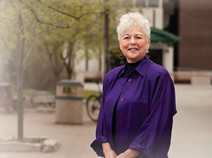EXCELLENCE in teaching and learning

Lakehead University is committed to excellence in teaching and learning and nowhere is this more evident than in the work of the Instructional Development Centre (IDC). Faculty, graduate students, and instructors from all disciplines turn to the IDC to become teachers who illuminate and inspire.
"It's exciting to see the work the IDC is doing," says Lakehead's 2011 Distinguished Instructor Award Winner Professor Pamela Wakewich. "When I began my career, I was literally just unleashed in the classroom. The only examples of teaching I had to draw on were those I had observed as a student."
In December 2011, the IDC hosted a week of activities on the Thunder Bay and Orillia campuses to celebrate teaching innovation at Lakehead University. The event, Building Bridges, focused on how Lakehead is integrating the community into its teaching, learning, and research.
"The IDC, in conjunction with other units, will be expanding Community Service Learning (CSL) on campus in the coming years. So having it as the theme seemed like a logical way to start," explains IDC Director Professor Rhonda Koster. "What makes me feel so passionately about CSL is that it provides an amazing opportunity to connect student learning, community need, and faculty expertise around a particular topic or issue." Five Lakehead faculty representing different disciplines, ranging from health sciences to chemistry, shared their own unique ways of connecting students with community partners. As well, seven undergraduate and graduate student groups, whose learning involved community organizations, made poster presentations as part of the Building Bridges activities.
One of the highlights of the week was Wakewich's Distinguished Instructor lecture, Boundary Crossings, which explored her reasons for weaving community-based research into her interdisciplinary and interactive approach to teaching. "Hearing lay people's voices in the classroom and discovering how a community is defining its issues is a powerful learning tool for students," she says, and a crucial component of interdisciplinary teaching. For Wakewich, who is a professor with both Lakehead's Sociology and Women's Studies departments as well as with the Northern Ontario School of Medicine's Human Sciences Division, interdisciplinarity introduces fresh perspectives and enriches scholarship.
Underpinning her educational philosophy is Wakewich's conviction that teachers are responsible for guiding students through the transition from being passive recipients of information to active learners. "Taking the time to meet with and mentor students," she explains, "makes a huge difference in their learning outcomes." As students undergo this evolution, they often inform Wakewich's work as a researcher. The questions they ask and the gaps they identify in the existing literature provide her with endless new ideas for research.
Frances Helyar, a professor in the Faculty of Education, spoke about the participation of education students at the Orillia campus in an internship program that affords them the experience of designing and teaching an educational program in a non-school setting, such as a museum or an art gallery. "Not only does this program build awareness of Lakehead University within the community," she says, "it allows students to make the connection that teaching and learning happens both in and out of school."
In Thunder Bay, Lesley Curthoys, a professor in the School of Outdoor Recreation, Parks, and Tourism (ORPT), discussed the broad spectrum of learning opportunities ORPT students enjoyed by planning and designing an interpretive ceremonial sign for the Sweat Lodge site on the University grounds. This CSL project, conducted in partnership with Lakehead's Office of Aboriginal Initiatives, enriched the students' perspectives and cultural worldviews. "Not only did the project provide a forum to discuss and apply the principles of interpretation, but as well it exposed us to the array of challenges associated with its application," commented one student. "Through active dialogue with the project's partners and the further development of our skill sets, these challenges were met resulting in an inspirational experience that truly engaged our minds."
The outstanding work of the Instructional Development Centre makes it clear that Lakehead and learning go hand in hand. Our instructors, no matter what the department or discipline, create collaborative environments that nurture the strengths of each student - from those stepping onto a university campus for the first time to graduate students immersed in teaching and research.

Planned giving is a great way to give back to Lakehead University.
It's a way to say thank you for the education I received from excellent professors who are experts in their disciplines concerned with broadening the minds of students.
My legacy gift, hopefully, will assist future students interested in researching oral health as an important part of healthy living.

HBA'81 (Philosophy)
MA'95 (Sociology)

